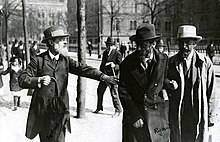Mensheviks

The Mensheviks ( Russian меньшевики , wiss. Translit. Men'ševiki, literally "minority") were a faction of the Social Democratic Workers' Party of Russia (RSDLP). In contrast to their internal party opponents, the faction of the Bolsheviks around Vladimir Ilyich Ulyanov (Lenin), they rely on orthodox socialism , according to which a bourgeois revolution must take place in Russia before the workers' revolution and not the party, but the leading role in the masses Revolution is coming.
history
The term originated in 1903 at the second party congress of the RSDLP in London , at which the party split. The supporters of Lenin, who called for an early overthrow in Russia, applied at this party congress to transform the RSDLP into a tightly run cadre party of professional revolutionaries. There was a slim majority (Russian bolschinstwo ) for the Leninian socialists, who from then on called themselves Bolsheviks . The minority (Russian Mensheviks ) who wanted to put the party on a democratic-parliamentary basis were called Mensheviks. Your speakers were Julius Martow , Pawel Axelrod and Alexander Martynow .
After the Russian Revolution of 1905 , the Mensheviks took over the leadership role within the Russian Social Democrats. In the fourth Duma (1912–1917) they had five members, the Bolsheviks seven. They actively participated in the formation of trade unions and workers' councils .
After the February Revolution of 1917 , the Mensheviks, together with the Social Revolutionaries, dominated the Soviets . Against the will of their left wing they entered the Provisional Government and thus maneuvered themselves into a delicate position: From now on they were jointly responsible for government action, and in the event of a lack of political and economic success it was foreseeable that the urban masses would pull away turn away from them and turn to the Bolsheviks. Because the Provisional Government continued the First World War , which was highly controversial within the Mensheviks , and only wanted to implement land reform after the election of a Constituent Assembly, the Mensheviks lost a lot of popularity during the months of dual rule. In the elections for the Second All-Russian Congress of Soviets in October 1917, the Mensheviks received 71 out of 611 seats, less than a quarter of the Bolshevik seats and far less than half of the Social Revolutionaries. Two months later, at the meeting of the Russian Constituent Assembly , the Mensheviks lost even more ground, taking only 18 out of 703 seats.
In the October Revolution , the Bolsheviks forcibly dissolved the Russian Constituent Assembly, in which they only won about a quarter of the seats. Within the Mensheviks, the left wing under Julius Martow now gained the upper hand, the so-called Menshevik internationalists. They tried, together with the Bolsheviks and the Left Social Revolutionaries, to form a coalition government of all Russian socialists, but this failed because of the determination of the Bolsheviks, which sought one-party rule. In the ensuing Russian Civil War , many Mensheviks fled the country. Martov and Iosseb Iremashvili found asylum in Germany , where Iremashvili wrote his book Stalin or the Tragedy of Georgia and where both died.
The Democratic Republic of Georgia was a stronghold of the Mensheviks . In parliamentary elections on February 14, 1919, they won 81.5% of the vote there, and from 1918 to 1921 they appointed the prime minister, Noe Schordania .
In 1923 the Menshevik faction was officially banned.
See also
literature
- André Liebich: From the other shore: Russian social democracy after 1921 . Cambridge, Mass., London 1997
- Leopold Henry Haimson (Ed.): From the Revolution of 1917 to the Second World War. University of Chicago Press. Chicago 1975
- Leopold H. Haimson, The Making of Three Russian Revolutionaries: Voices from the Menshevik Past
- Evelyn Holloway (publisher / translator): Texts of the Mensheviks on the Russian Revolution and the Soviet State 1903-1940. Socialist revolution in an underdeveloped country . Junius Verlag, Hamburg, 1981. ISBN 3-88506-111-2 .
Web links
Individual evidence
- ^ Boris Sapir: Notes and Reflections on the History of Menshevism. In: Leopold Henry Haimson (Ed.): From the Revolution of 1917 to the Second World War. University of Chicago Press. Chicago 1975, pp. 364-377.
- ↑ dtv lexicon on history and politics in the 20th century , ed. v. Carola Stern , Thilo Vogelsang , Erhard Klöss and Albert Graff, dtv, Munich 1974, vol. 2, p. 520; Manfred Hildermeier : The Soviet Union 1917–1991. Oldenbourg, Munich 2007, p. 11.
- ↑ Manfred Hildermeier, The Russian Revolution 1905-1921 , Suhrkamp, Frankfurt 1989, p. 227.
- ↑ Martin Grohmann: The Russian Revolution and the Soviet Union. Student book . Cornelsen, Berlin 2009. p. 67.
- ↑ dtv lexicon on history and politics in the 20th century , ed. v. Carola Stern , Thilo Vogelsang , Erhard Klöss and Albert Graff, dtv, Munich 1974, vol. 2, p. 520.